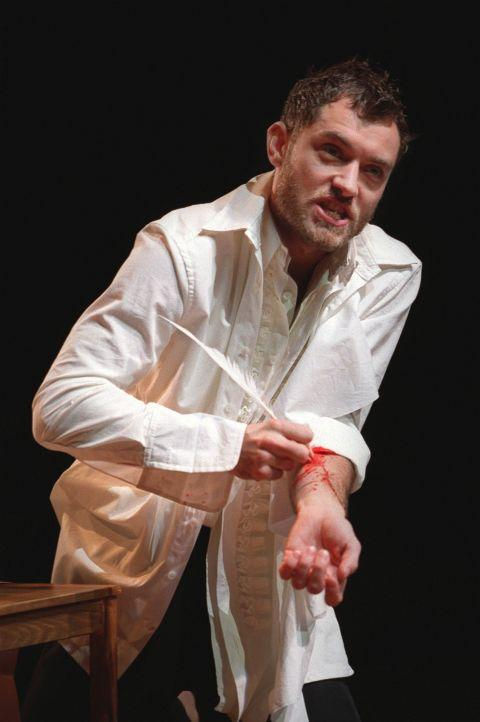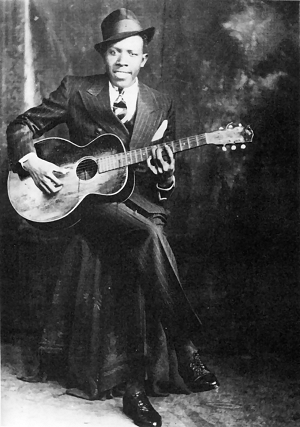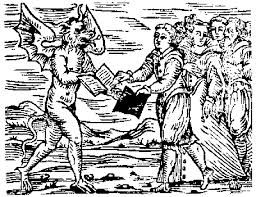Dealing With the Devil: The Popularity of Faustian Myth (With Pippa Harris)
- connorbevanband
- Feb 22, 2015
- 15 min read

Deals with the devil such as Saint Theophilus the Penitent’s bargain for an ecclesiastical position over a man that had wronged him, are strikingly common across the history of not only Christendom but countless other religions also. Theophilus the Penitent (or Theophilus of Adana) sought the counsel of the devil after he doubted his humility in turning down the position of Bishop of Cilicia, in order to allow another to take his place.[1] The bishop he had allowed to take his place then deprived Theophilus unfairly of his own position provoking the Saint to commune with Satan, renounce Christ and hand over his very soul in exchange for the position of Bishop… or so the story goes, if you believe in such things. Theophilus’ story is characterised by a muddle of details (as such stories often are) which include the presence (and blame) of Jews and wizards, the Virgin Mary and the promises of riches and treasures. There is even scepticism as to whether the picture above in fact depicts him or Saint Augustine or indeed Saint Wolfgang, who rather suspiciously (and lazily) managed to convince the devil to construct a church for him - of all the ironic workmen. Now personally, if I was a Christian travelling in Bavaria and looking for a house of God to duck into and have a quick pray that would be my last idea of sanctity. If the Vicar told me “Good morning my child, this is a beautiful church we have here… It was built by Satan actually” I’d probably be driving down the autobahn at high speed very promptly. But anyway…
Despite confusion over details of Theophilus’ interesting legend of signing his soul over to devil there is one thing that it certainly does tell us quite undeniably. This being that this is the first kind of interaction with the devil (in Catholicism at least) that we can historically identify from a very long line of remarkably popular and recurrent tales of communing, bargaining or dealing with Satan. Since the creation of the play Doctor Faustus these have become known as Faustian myths. The purpose of this essay is not only to speculatively identify this series of intriguing and mysterious accounts and their running themes but also to comment on a few things that such accounts reveal. These accounts can also be seperated into three rough categories (which I shall expand on later) which display how increasingly popular this particular element of stories becomes. To fail to remark on the strange fascination and true extent to which they are received and redeveloped in popular culture would be negligent also. The tale of Theophilus can be seen to directly influence other stories of folklore and entertainment and it has been observed that ‘the legend served as the basis for the later Faust theme’.[2] Indeed, the most famous and exemplifying story of such an encounter can be seen in Marlowe’s classic play Doctor Faustus – one of my girlfriend’s favourite plays. Since she is a student of literature I thought it better that she write this next part to save me embarrassing myself.
“The Tragical History of Doctor Faustus was written by Christopher Marlowe; it is believed (and rightly so), that Marlowe gathered his material for this play from the medieval legend of a man, Johann Faust who was in league with the devil, in order to gain his unearthly wants and desires. Marlowe’s Doctor Faustus is a morality play that holds true to most of the concepts which are key within this type of literature. These concepts include the Good and Evil Angels who are representing the moral qualities which everyone is perceived to struggle with on a daily basis, either inwardly or in the view of the public eye. This play is fundamentally about a man’s struggle with his conscious, moral and religious beliefs when he is trying to come to terms with how he will be procuring his desire to go beyond his mortal intelligence and boundaries. Faustus is a highly successful and brilliant man but he wants more and it is this want to become more than he is, which leads him to make a pact with the devil.
Throughout the beginning of the play, it is obvious that Faustus doesn’t believe that God loves him, and so he is trying to persuade himself into thinking that he would benefit more by promising himself to Lucifer, however it is also clear that Faustus is full of self doubt and confusion, and is torn between right and wrong. Faustus believes that his soul is damned and this is unavoidable which is evident in the line ‘must thou needs be damned’ (2.1.1) Faustus is pushing himself onwards with his decision and is telling himself not to backtrack on his resolution. This opening soliloquy is made before he makes and signs the contract to sell his soul; which seems to accentuate the uncertainty in Faustus’ mind as to whether he is sure he is doing the right thing. The Good and Evil Angels appear and are vying for Faustus’ attention; the Good Angel wants Faustus to repent and in doing so, be able to enter into Heaven, whereas the Evil Angel is being a cheeky bastard trying to lure Faustus into practicing the dark arts by playing on what is already in place within Faustus’ mind, enticing him to ‘think of honour and wealth’ (2.2.21) which is what Faustus is dreaming of, as he wants to further himself beyond what he has already achieved in his life. This is similar to the story of Theophilus. The appearance of these two Angels also serve as a visual representation of Faustus’ torn conscience between Goodness and Evil which has been repeated in popular culture ever since… from Simpsons to Family Guy. The Good Angel personifies Faustus’ desire to repent his bad ways ‘leave that execrable art’ (2.1.15) and the Evil Angel personifies his desire to serve the devil, as he believes that ‘Contrition, prayer, repentance’ (2.1.16) are mere ‘illusions, fruits of lunacy’ (2.1.18).

The first half of this play reflects Faustus’ inner struggle with his own mind; he is torn between following the path of God or that of the devil, Marlowe is expressing this uncertainty within the following passage, which opens Faustus up to the audience as a morally ambiguous man: ‘Ay, and Faustus will turn to God again. To God? He loves thee not.’ The god thou servest is thine own appetite, Wherein is fixed the love of Beelzebub.’ (2.1.9-12) Faustus refers to himself in the third person throughout the play, giving the audience (or the reader - for those of us strange enough to enjoy reading plays), the impression that he is trying to reassure himself in regards to his torn state of mind about where his loyalties should lie; should he be obedient to God or to Lucifer? It is quite common that mental conflict and dangerous desires plays a part in such stories.
One of the most significant and intriguing parts of Doctor Faustus is the signing of the pact with the devil which is a critical element in all Faustian Myth. This was done so in Faustus’ blood, which has a rather gruesome but fascinating hold upon both audiences of Marlowe’s time, and of people who are viewing and reading the play today. The signing of the pact in blood is an important concept as when Faustus goes to sign his name, his blood begins to congeal which alarms Faustus; making him begin to question his actions ‘What might the staying of my blood portend? / Is it unwilling I should write this bill?’ (2.1.62-63). Faustus signing in blood is a physical representation of Lucifer’s hold over him for the next 24 years, and of Faustus’ tie to the devil. The letting of his blood is seen as both a deliverance and a perdition of Faustus’ soul and desires. Lucifer then gives him a buddy and ‘hires’ his handyman Mephistopheles, who’s position is now to grant every wish and inclination that Faustus has in terms of magical powers and knowledge.
Over the next 24 years, Faustus acquires knowledge and power that is given to him on his every whim by Mephistopheles, as well as indulging in food, drink and women. At the end of his given time Faustus is given the chance to repent his sins, which he refuses to do, which is either done out of vanity or stupidity, this in itself is ironic and quite ridiculous when you consider the amount of brilliant knowledge which he now has stored up within him. When the clock strikes the agreed upon time of 11, Faustus begins to give a frenetic monologue where he calls for mercy and of course, this is dismissed and ignored by Lucifer who has Faustus dragged away and then ripped apart by his minions. This brutal ending is one that has the aim of scaring and warning the audience into thinking of their actions and the ensuing consequences of them, as the decisions you make in your life will define the structure of your death being either celebrated in heaven, or tortured for eternity in hell.
Throughout history there has always been a public interest in the idea that we now know as Faustian Myth; before Marlowe wrote this fantastic play, the church made use of exsiting ideas of devil contracts as well as inventing them for manipulative and progressive purposes - Marlowe’s play was one of the first widespread major instances where these ‘myths’ were in fact anything but; the Faustus storyline is one that did, and still does, captures and draws in the fascination that the public has with the devil and how his presence can affect and reveal someone’s life so drastically. The rather menacing idea of devil-contracts and selling your soul to Lucifer was brought out into the open by someone who was not involved in the Church, therefore this made Marlowe’s play one of the utmost intrigue to the public. As time has gone on and more people came to hear about Doctor Faustus, the general idea of selling ones soul to the devil in exchange for power or knowledge became more and more popular. This widespread interest in this subject brought about more literary tales such as ‘Faust’ by Estanislao del Campo (1866) and more in between, up until the present day ‘Faust’ by Edgar Brau (2009). Other forms of entertainment such as Opera pieces and symphonies were created around Marlowe’s concept of Doctor Faustus; these in turn bring in a wider range of audiences depending on ones likes and tastes, which is keeping Faustian Myth alive and as popular as ever, within today’s culture.”

Me again. So if Theophilus’ is indeed the ‘oldest story of a devil-contract’ as Paul Carus maintains[3] then Doctor Faustus is the archetype of such a deal. As a side note it should perhaps be mentioned that such fables in Christianity helped to establish certain changes in doctrines. For example, in Theophilus we observe particular shifts in Christian ideals concerning the Virgin Mary which was growing in importance in Catholicism at this point[4] and how the devil presents himself to humanity. Often communing required certain taboo practices involving sexual acts, murder and sacrifices, furthermore such deals with Lucifer would most often lead to detrimental results. From this we can establish that these tales were reinforced in order to generate even more stigma over these sinful acts. In other words "don’t have sex outside of marriage or worship idols as these practices are associated with witchcraft, paganism and Lucifer and you'll get in trouble". Oddly enough Paul Carus also notes that this line of relationships with the devil encountered throughout history is characterised by blood signing (Which we see as the predominant form as portrayed in Marlowe’s work), contracts and documents. Surprisingly this legislative aspect is often believed to protect Satan himself from being cheated and not the participant. Carus even goes as far as to claim that ‘not one case is known, in all devil-lore in which the devil attempts to cheat his stipulators’ but gives them clear choices contrary to what we may think.[5] Throughout theological history God, popes, saints and other men have attempted and succeeded to trick the devil and so he does this to apparently shield himself from deceit according to some.
So, aside establishing that these fictitious accounts serve some theological and religious purpose, whether intended or not, what else can we infer from these stories? As an atheist I should point out that I don’t believe in the possibility of such occurrences. However, that does not infer that they are not worthy of study, indeed all aspects of religion should most definitely be explored - sociologically and psychologically they are incredibly revealing and tell us a little about what it means to be human whether remarkable fantasies or not. Marlowe’s tale is one that removes the overbearing theological element in the previous fantasies and is strictly one of magnificent and timeless entertainment. From this, as noted the idea has been recycled and alluded to in secular fiction and folklore to this present day. So what we have is a long lineage of religious legends that remain curiously prominent in folklore. These are then transformed for the purposes of entertainment into yet more thrilling narratives. Now before I speculate as to what this discloses concerning humanity there is one more story that must be told. This story shall reveal a third type of Faustian Myth, one where the myth is attributed (often personally) to real people in society.
In Hazlehurst, Mississippi there was a young blues musician named Robert Johnson. The story goes that Johnson could play harmonica and jaw harp to a fairly good standard but when it came to guitar he was hopeless. The legendary blues players Son House and Willie Brown noted this and it seemed as though he would never master the guitar. In a time and setting torn with social strife and injustice and no widely accepted standards, teachers or theory as to how to play most instruments Johnson struggled.[6] Superstition and Afro-American religions informed most people's lives and dominated the lyrics performed by those who would attempt to play music in such times. Curiously, the historian Robert McCormick notes how his wife's death was regarded by her relatives as divine retribution for his decision to sing secular songs which was commonly known as 'selling your soul to the devil'. Moreover he argues that Johnson accepted this and other more outlandish claims which we shall examine as a salute to his committed decision to adopt the full time lifestyle of an itinerant or travelling musician.[7]

In his early life he reportedly took off travelling to Martinsville, possibly searching for his natural father and some answers; this is where something strange happened. One dark night he was seen suspiciously at the crossroads near Dockery Plantation handing his guitar over to a large black man, said to be the devil himself. The figure took the guitar from his hands, tuned it, played it a little whilst Johnson waited patiently and then handed it back to him. Suddenly Robert Johnson had miraculous guitar technique as if by magic. This is said to be a deal of the exact kind that we see exemplified by Doctor Faustus whereby Johnson sells his soul in exchange for mastery over his instrument. After playing in juke joints and street corners Johnson played his set of 29 gramophone recordings in a hotel room, eerily facing the wall of the room. Though some became regional hits many shared distaste for his sexual, clever, blasphemous and often sombre lyrics. To say nothing of his guitar playing, his microtonal voice has been admired by many musicians; with its deep range of emotion and tone many say you can hear the possession of the devil in his singing. Considered one of the best of his ilk his guitar playing was so complex and advanced with a fusion of multiple techniques that Brian Jones of The Rolling Stones asked “Who is the other guy playing with him?... I was hearing two guitars, and it took a long time to actually realise he was doing it all by himself".[8] Keith Richards likened it to an ‘orchestra’.[9] His technique is often associated with the selling of his soul.
There has been speculation as to whether it was Satan that Johnson met or even the African trickster god Legba, though some scholars disagree that Legba would even be known to these people.[10] Ferris states that blues players were seen to have seductive powers over women and that this ‘fits in with this old African association with the crossroads where you find wisdom: you go down to the crossroads to learn, and in his case to learn in a Faustian pact, with the devil’.[11] His womanising and the poisoning from a jealous husband are often attributed to his deal with the devil. His life itself is surrounded by mystery, posthumous biographies, violence and gossip, so much so that he has been an immense source of historical study. There are only three known pictures of him and many wild stories flying around. Even his death is surrounded by the same type of legends that haunt his life; with three alleged grave sites and a poisoning that led to his practically starting the ’27 club’. Eric Clapton, The Rolling Stones, Led Zeppelin and many more would cover and admire his music and his life has been the subject of countless documentaries, books and films… Though I think we all need to forget that awful 80's film Crossroads starring the Karate Kid (well maybe not the quite awesome guitar duel situated in hell).
My question is that though Robert Johnson changed music it was done rather subtly and through focus on his work and life from after his death; would people have been so drawn to him in the absence of the Faustian Myth and all the aspects of his life that supplement it? Possibly not. Would I have covered his music? I remember hearing Robert Johnson for the first time one night and thinking “right, what the hell is this shit I’m listening to?” Then oddly enough it was when my bandmate Kieran told me the Faustian stories that I found myself deeply intrigued more and more as the crackly recordings and wailing continued to play, and thus my love of blues was born.
Now back to our point. What is striking is that not only was this fable surrounding the mysterious Robert Johnson popular but it was accepted and encouraged by his friends and fans. Though largely fabricated and overdeveloped by white fans mostly in the 60's his deal with the devil and all the vices that came with it has become astonishingly favoured. It strikes me as spectacularly strange to consider that stories like this are not only desirable for religious purposes (In most 'pre-Faustus' Faustian Myth) and entertaining fictitious characters (In Doctor Faustus onwards) but also for many genuine figures of history. Many metal and blues musicians have even attempted to emanate Johnson in the Faustian fashion by claiming to have sold their souls for musical mastery[12][13]. The idea that so many people would be willing to not only accept the claim that they had made a pact with the devil but also wish for the reality of this story for purposes of fame is exceptionally intriguing. Just what is it that makes this act so entertaining and timeless? And as for those who believe they truly have communed with Lucifer, just how much must they crave these material desires of wealth, political power and even musical excellence? Just as Theophilus can be seen to exemplify the theological notion of such a pact, and Dr Faustus shows us the paradigm of Faustian Myth in popular entertainment, Johnson is one of many to be seen to sell his soul for music. Though Johnson is one of the most famous he is perhaps rivalled in fame by Niccolò Paganini who is said to have sold his soul for virtuoso violin skills in the 19th century - playing along with the myth for the purposes of fame.[14]
Once the Faustian Myth was embedded into popular culture it is shocking how often it crops up. I discovered that supporting my point is a small dusty book upon my shelf by Ken Radford entitled Tales of Witches & Sorcery and the first tale we are given is that of the famous Witches of Salem and this includes a passage that speaks ‘The devil came to me and bid me make my mark with blood in his book’.[15] (Concerning witchcraft in this context I have written a reply to Tom).
What I think is most compelling about this enduring theme is the particular emphasis on the soul and that it is a narrative of antipodes. That is - great fictitious extremes that juxtapose one another in these stories; not only do we see the soul as the most precious thing one can give but the devil as the embodiment of surely the most utterly evil thing itself and of course our material desires and wants are considered somehow more valuable than our souls. Of course, I’m not a dualist (I don’t believe in the notion of a soul being a separate entity to my body or something that can be sold or removed) and neither are many people that are attracted to these accounts. Yet I think these tales serve as a telling recognition of the intense ambitions of mankind. Theophilus valued his position and pride over his soul, Faustus valued wisdom over his eternity and Johnson valued fame and skill over his spirit. This piece was a little longer than I intended so I’ll leave the final speculation to the reader. Is it because we are so appalled by the lengths we see these individuals go to in order to reach their goals that we are so drawn to these mythical events… or as clearly some do - is it because in some way we see our wanting selves in these characters - at a crossroads and desperate for our desires?

[1] Catholic Online, St. Theophilus the Penitent <http://www.catholic.org/saints/saint.php?saint_id=2271> [Accessed 15 February 2015]
[2] Ibid.
[3] Paul Caurus, The History of the Devil and the Idea of Evil: From the Earliest Times To the Present Day (1900. Reprint. London: Forgotten Books, 2013) p. 415 <http://www.public-domain-content.com/books/history_devil/hod19.shtml> [Accessed 15 February 2015]
[4] Saint Alphonsus de Liguori, Fatima Network Crusader, Mary's Intercession Is Necessary for our Salvation (1750) <http://www.fatimacrusader.com/cr13/cr13pg22.asp> [Accessed 15 February 2015]
[5] Carus, The History of the Devil and the Idea of Evil: From the Earliest Times To the Present Day p. 415
[6] Barry Lee Pearson and Bill McCulloch, Robert Johnson: Lost and Found (Chicago: University of Illinois Press, 2003) p. 111
[7] Robert "Mack" McCormick, The Search For Robert Johnson (1992) [On TV]
[8] Andrew Buncombe, ‘The Grandfather of Rock'n'Roll: The Devil's Instrument’, The Independent, 26 July 2006, <http://www.independent.co.uk/news/world/americas/the-grandfather-of-rocknroll-the-devils-instrument-409317.html> [Accessed 16 February 2015]
[9] Keith Richards quoted in Elijah Wald, Escaping the Delta: Robert Johnson and the Invention of the Blues (New York: Amistad, 2004) p. 107
[10] David Evans, Demythologizing the Blues (1999) <http://www.crookedsaws.com/myths/> [Accessed 16 February 2015]
[11] Bill Ferris, American Public Media: The Story with Dick Gordon [On TV]
[12] Dick Weisman, Blues: The Basics (New York: Routledge, 2005)
[13] Gorgoroth, Band Biography, <http://www.gorgoroth.info/biography/> [Accessed 16 February 2015]
[14] Harold C Schonberg, The Lives of the Great Composers (New York: W. W. Norton & Company, 1998)
[15] Ken Radford, Tales of Witches & Sorcery (London: Chancellor Press, 1993) p. 29-30
Doctor Faustus References – Christopher Marlowe (1604), John O’Connor, Doctor Fautus: The A Text (Essex: New Longman Literature, Pearson Education, 2003)


Comments